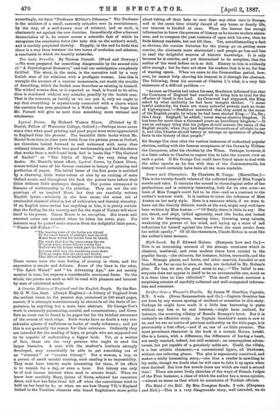A Concise History of England and the English People. By
the Rev. Sir G. W. Cox, Bart. (Joseph Huglies.)—A history of England from the earliest times to the present day, contained in 500 small pages, cannot, if it attempts conscientiously to chronicle all the facts of im- portance, be anything but a mere bare abstract. Sir George Cox's work is eminently painstaking, careful, and conscientious; and there- fore no room can be found in its pages but for the briefest statement of the events of each reign. Such works have no doubt a very con- siderable sphere of usefulness as books of ready reference ; and yet this is not generally the reason for their existence. Ordinarily they are intended for the reading of boys, or people who are supposed not to be capable of undertaking a bigger book. Yet, as a matter of fact, these are the very persons who ought to read the larger histories. A man with the student's instincts strongly developed, may conceivably be able to get something oat of an" abstract " or "concise history." For a woman, a boy, or a person of small mental training, such reading is an impossibility. They must have history made interesting for them, if its effect is to remain for a day, or even a hour. But history can only be of real human interest when read in minute detail. When we know how carefully Mary, Queen of Scote, selected her execution dress, and how her false front fell off when the executioner tried to hold up her head by it ; or when we see how Henry VIL's England looked to the Venetian observer who found Englishmen more polite
about taking off their hats to men than any other race in Europe, and at the same time utterly devoid of any home or family life, our interest is kindled at once. When the learner has enough information to know the persons of history as he knows modern states- men, and to compare the past customs of ages with his own, then he finds history readable, but not till then. Yet, notwithstanding a feet so obvious, the concise histories for the young go on getting more concise, the abstracts more abstracted ; and people go less and less to read the delightful sources of historic knowledge. It is only because he is concise, and yet determined to be complete, that the author of the work before us ie so dell. History to him is evidently alive enough; but he dare not show his readers that it is so, for fear of wasting space. When we come to the Cromwellian period, how- ever, he cannot help showing his interest in it through the abstract. The following, from his account of Charles L's trial, is a very fair statement of a difficult problem "As soon as Charles had taken his seat, Bradshaw informed him that the Commons of England had resolved to bring him to trial for the effusion of blood in the land. As Cromwell had supposed, the King asked by what authority he had been brought thither. 'I mean lawful authority, for there are many unlawful powers, such as those of highwaymen.'—Bradshaw answered that they acted in the name of the Eoglish people, by whom he had been elected King.—' No, Sir; this I deny. England,' he added, 'sever was an elective kingdom. It has been for more than a thousand years an hereditary kingdom.'—Ib was an unhappy thing that his judges should assume the name of the English people, when they had deprived themselves of allright to use it, and that Charles should betray no strange an ignorance of glaring facts in the history of that people."
Sir George Cox then cites the various instances of undoubted popular election, ending with the famous acceptance of the Crown by William the Conqueror, after his election by the Witan. Perhaps, however, it, is a little unfair to Charles to expect him to take the correct view on such a point. If Sir George Cox could have found eyed to deal with the other epochs as he has with that of the Commonwealth, his history would certainly have been all the more readable.


































 Previous page
Previous page